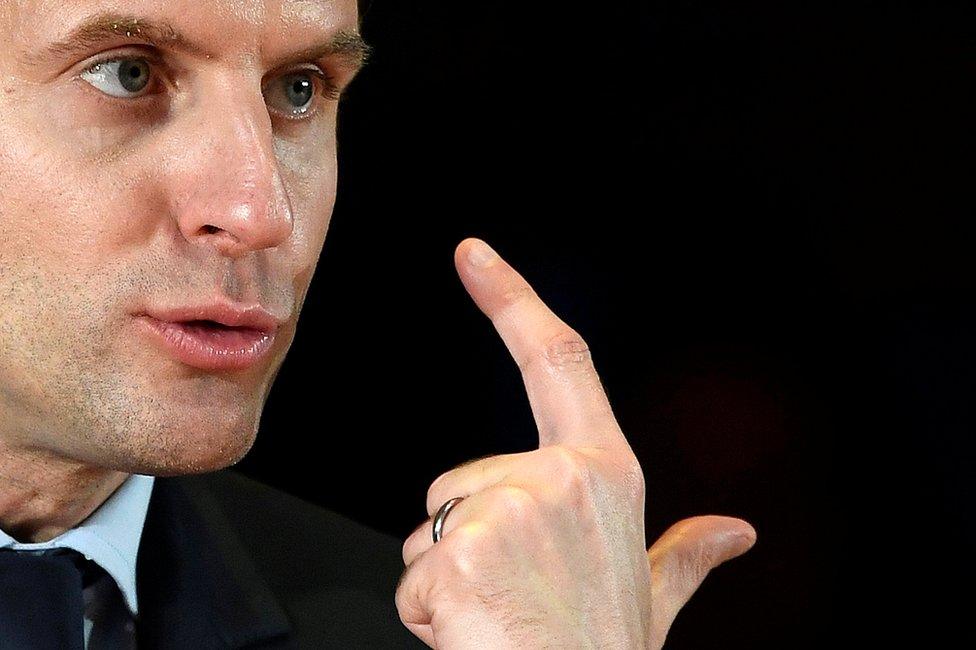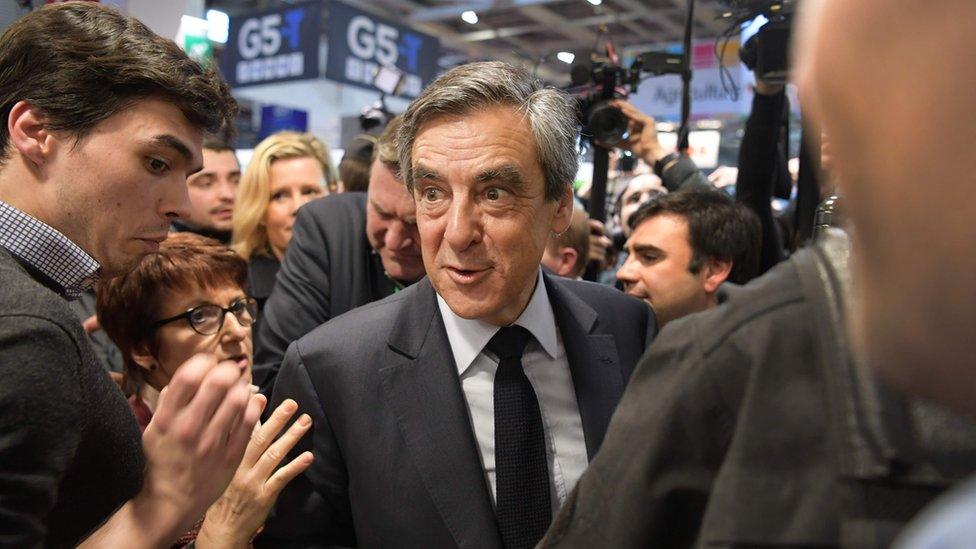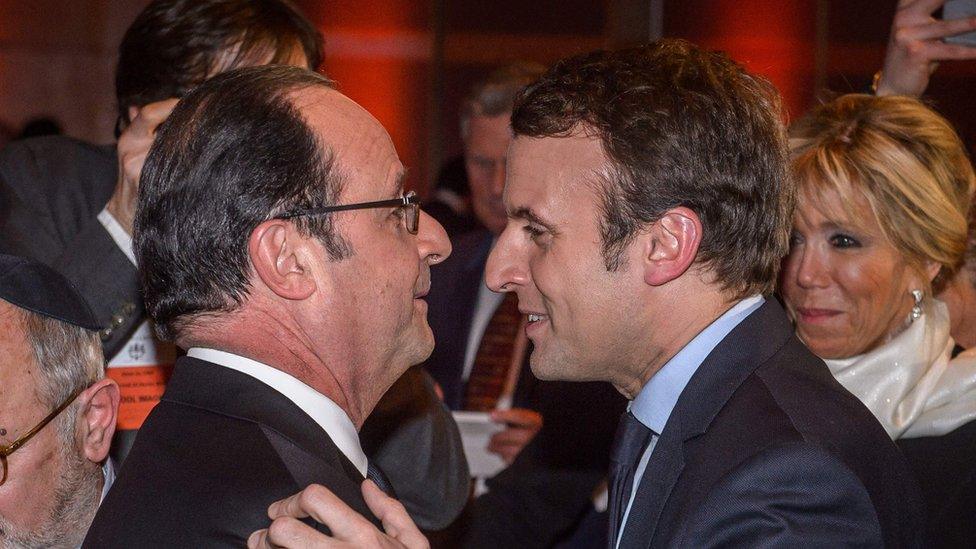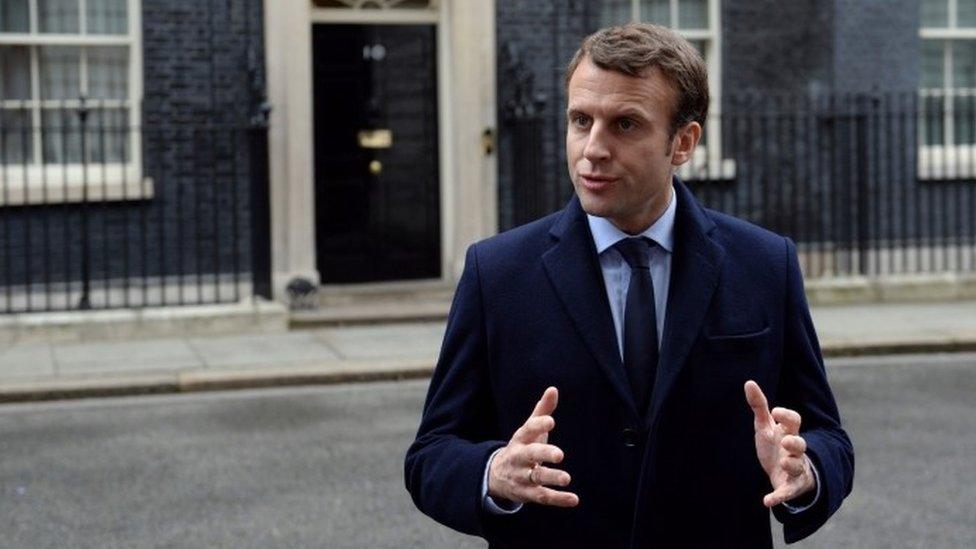France election: What does centrist Emmanuel Macron stand for?
- Published

Emmanuel Macron says left and right in politics are irrelevant
Presidential candidate Emmanuel Macron has emerged as a major force in French politics despite never being elected to office.
The independent centrist's campaign has been boosted by the setbacks of centre-right rival Francois Fillon, who faces formal investigation over fake job allegations involving his wife.
Mr Macron seems likely to face the far-right National Front's Marine le Pen in a second round of voting, and he is seen as a key defender of liberal European values from populist forces on the continent.
Amid accusations that he was all image and short on substance, he launched his election campaign on 2 March.
What is the general direction of his policies?
Mr Macron has maintained that the left and right in politics are irrelevant and out of fashion.
He was economy minister in President Francois Hollande's centre-left Socialist administration until last year, but has played down his links to Mr Hollande.
His current movement was a new project and definitely not a continuation of Mr Hollande's, he said at the campaign launch.
Instead he has urged France to rediscover its "spirit of conquest", and called for a "transformation" rather than just reform, in which every French citizen would play a part.
What is his response to the Fillon scandal?
As Mr Fillon faces questions over his wife's employment, his rival has proposed eradicating "nepotism" and "conflicts of interest".
"All elected representatives must respect the law and public morality," he said at the launch.

Mr Fillon has vowed to continue his campaign despite questions about his wife's employment
The measures he is proposing include banning MPs from doing any consulting work and banning all officials from employing family or friends.
He is also seeking to cut the size of both chambers of parliament - the National Assembly and the Senate - by a third.
How tough on security?
Mr Macron has not said whether he would lift France's state of emergency, launched following the Paris attacks in November 2015, but he has promised to "evaluate" it.
He said no new measures would be taken on terrorism, and ruled out what he described as symbolic policies such as removing French nationality from dual citizens, which would only divide the country.
He would not accept stigmatising people for their religion, or religious-based bigotry, he added.

Mr Macron (R) has sought to distance himself from former mentor Francois Hollande
The key was to make existing security measures work more effectively, he said.
He has, however, promised 10,000 more police officers - similar to a pledge made by Marine Le Pen - and the rebuilding of regional intelligence networks.
Mr Macron has also emphasised a revival in community policing, and in particular rebuilding relations between police and young people.
Defender of Europe
While Ms Le Pen seeks to take France out of the eurozone and hold a referendum on France's relationship with the European Union, Mr Macron is an ardent supporter of the EU.
He has called for efforts to reinvigorate the eurozone and a new impulse for the single market, which he said should be vigorously defended in Brexit talks with the UK.
'Roadmap against terror'
Mr Macron caused some consternation among conservative circles a few weeks ago by describing France's colonialism as a "crime against humanity". He has since apologised for "hurting some people's feelings" but has not withdrawn the statement.
On defence, he has proposed increasing spending to 2% of GDP - a key demand of the US and other Nato allies.
He is also calling for an "international roadmap" to combat militant Islamism, and described Africa as a region that had "all the risks and all the opportunities" for France.
'Transforming' employment
Mr Macron has urged French workers to embrace a transformation of the workplace.
"Work is going to change and we will be part of that change. We will go with it and we will transform the balance of forces," he said.
He has proposed aligning the public sector pension scheme with the private sector. Such measures have been tried in the past and have provoked huge opposition from the left, but he describes the move as an end to inequality between schemes.
He has also pledged no change to the retirement age for five years, and to retain the 35-hour working week, both moves seen as directed at left-wing voters.
Austerity
In a budget programme unveiled days before his campaign launch, Mr Macron proposed savings of €60bn ($63bn; £51bn) over five years, including cuts to the civil service.
He also pledged to keep the deficit to below 3% of economic output.
Devolved education
Mr Macron has made education one of his main priorities.
He has pledged to put the three "Rs" at the heart of education policy and reduce class sizes.
He describes the education system as being "too uniform" and says more control over policy should be given to local authorities.
- Published21 February 2017
